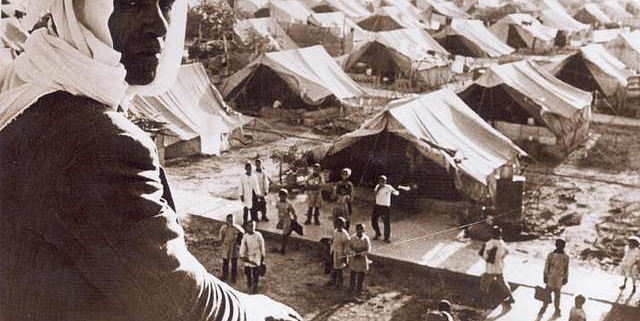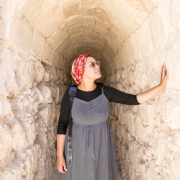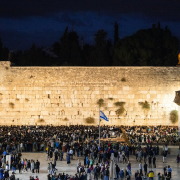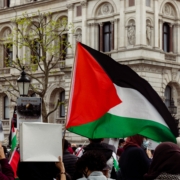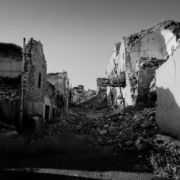Who is Responsible for the Nakba?
“There is much truth to the Palestinian claim of loss and displacement. Many innocent Palestinian Arabs did die in this war. And hundreds of thousands more did become refugees. But this nakba narrative glosses over one critical issue: causation. The fact is that this Palestinian tragedy was the direct result of Palestinian action.” 1
–– David Brog
You may have heard that Israel is responsible for the “Nakba,” or “catastrophe.” Some people claim that to establish the modern state of Israel in 1948, Jewish people ethnically cleansed the region of Arab-Palestinians, forcing 750,000 Arabs to leave their homes and become refugees. This event became known as the Nakba. Is this narrative true?
What events led to the Nakba?
First, let us look at the events that led to the Nakba.
Following the Holocaust of World War II––where six million Jewish people were murdered by the Nazi regime and hundreds of thousands left as refugees––Great Britain, which controlled the region known as Palestine, deferred to the United Nations to decide how to divide this land into two states—a Jewish state and an Arab state.
On November 29, 1947, the United Nations General Assembly officially voted on a two-state solution. It allotted the Jewish people fifty-six percent of the region, much of which was in the arid Negev desert, and the Arabs forty-two percent, but with much less desert area. Jerusalem and Bethlehem would remain under international control.2
The Jewish people accepted the two-state solution, but the Arabs rejected it and started violent uprisings against it. Jamal Husseini, the Arab Higher Committee’s spokesman, said the Arabs would drench “the soil of our beloved country with the last drop of our blood” to prevent the creation of Israel.3 And that is exactly what they attempted to do.
By the end of March 1948, Palestinian Arabs had killed more than 900 Jews and wounded an additional 1,858.4 Arab leadership proudly assumed responsibility for the violence: “The representative of the Jewish Agency told us yesterday that they were not the attackers, that the Arabs had begun the fighting. We did not deny this. We told the whole world that we were going to fight,” Husseini told the U.N. Security Council on April 16, 1948.5
On May 14, 1948, Israel declared its independence, in cooperation with the UN Partition Plan. The following day, five Arab armies—Egypt, Syria, Transjordan, Lebanon, and Iraq—invaded Israel. After more than nine months of fighting, Israel won the War of Independence with little help from the West.6 The war formally ended with the signing of armistice agreements between Israel and Egypt, Syria, Transjordan, and Lebanon, with Iraq refusing to sign one, and with Transjordan and Egypt occupying most of the land the UN had partitioned for an Arab state in Palestine.7
Why did 750,000 Palestinians flee their homes?
Those who blame Israel for the Nakba claim that Jewish forces expelled 750,000 Palestinians from the land to ethnically cleanse the region in preparation for a Jewish state. As one writer put it,
Palestinians around the world . . . mark the Nakba, or ‘catastrophe,’ referring to the ethnic cleansing of Palestine. . . . The creation of Israel was a violent process that entailed the forced expulsion of hundreds of thousands of Palestinians from their homeland to establish a Jewish-majority state, as per the aspirations of the Zionist movement.8
Many who make this claim cite Israeli historians such as Benny Morris, who first documented that Jewish forces did expel multiple Arab villages. However, Morris makes clear that the reason for such expulsions was because of military necessity, not ethnic cleansing, and that these expulsions only accounted for a small number of the refugees. Most Arab Palestinians fled their homes to avoid being caught in the crossfires of war. Historian David Brog explains,
[Morris] demonstrates quite clearly that while Israeli expulsions did take place, they were motivated by military necessity, not racial animosity. And his research further shows that these Israeli expulsions produced only a minority of the refugees. Many Arabs were in fact ordered to leave their homes by Arab leaders and commanders. And the large majority of Arab refugees fled on their own initiative—because they were afraid of a war being fought in their towns, villages, and neighborhoods.9
As Brog mentions, many Arabs also fled due to Arab leaders commanding them to do so to make way for the invading Arab armies. Those who remained were viewed as traitors. Even the British newspaper The Economist, a critic of Zionism, reported on October 2, 1948:
Of the 62,000 Arabs who formerly lived in Haifa, no more than 5,000 or 6,000 remained. Various factors influenced their decision to seek safety in flight. There is but little doubt that the most potent of the factors were the announcements made over the air by the Higher Arab Executive. . . . It was clearly intimated that those Arabs who remained in Haifa and accepted Jewish protection would be regarded as renegades.10
Those Arabs who remained in their homes within Israel’s borders after the War of Independence immediately became Israeli citizens with full equal rights and protections. As a result, one in every five Israeli citizens today is Arab.11
What about Palestinian refugees today?
Though there were 750,000 Arab-Palestinian refugees after the war, the United Nations estimates that there are more than 5.9 million today, since four generations of descendants are eligible for refugee status, even those who have resettled and gained citizenship in Jordan.12 Alan Dershowitz, professor emeritus at Harvard Law School, writes,
Unlike all other refugees worldwide, Palestinian refugees are treated to a separate U.N. agency, with a separate definition of refugee and a separate mission. If the standard definition of refugee (which applies to all other refugee groups) were to apply to the Palestinians, the number of Palestinian refugees would fall precipitously.13
While the Palestinian Territories and Israel’s surrounding Arab countries have refused to resettle the Arab-Palestinian refugees, Israel has absorbed the 850,000 Jewish refugees that were expelled from Israel’s neighboring Arab countries in the wake of Israel’s War of Independence. These Jewish refugees never saw their homes again, and all their belongings were confiscated by the Arab nations from which they fled. Dershowitz explains,
There was “an exchange of populations,” with the Jewish refugees having been forced to abandon far more of their property and wealth than the [Palestinian] refugees left behind. . . . The difference is that Israel worked hard (although not always with complete success) to integrate its refugee population into the mainstream, while the Arabs deliberately encouraged Arab refugees to fester by keeping so many of them in camps, where many still remain, and refusing to integrate.14
Even King Hussein of Jordan, in an interview in January 1960, accused Arab leaders of intentionally perpetuating the Palestinian refugee problem instead of resettling them so that they could use them as political pawns: “They [Arab leaders] have used the Palestine people for selfish political purposes. This is ridiculous, and, I could say, even criminal.”15
In conclusion, we believe the Nakba—the uprooting of 750,000 Palestinian Arabs from their homes during the events leading up to and following the war of 1948—was a direct result of the actions of Arab leadership. Had the Arabs accepted the UN Partition Plan in 1947 for a two-state resolution instead of violently fighting against it, there would be no Palestinian refugees, no Nakba, and instead, there would be a seventy-five-year-old Palestinian state beside Israel today.
Footnotes
- David Brog, Reclaiming Israel’s History: Roots, Rights, and the Struggle for Peace (Washington, DC: Regnery Publishing, 2017), 126.
- Brog, 128.
- Mitchell G. Bard, The Complete Idiot’s Guide to the Middle East Conflict (New York: Penguin Group, 2008), 127.
- Efraim Karsh, Palestine Betrayed (New Haven, CT: Yale University Press, 2010), 118.
- Bard, 130.
- Bard, 132, 136.
- Brog, 147.
- “The Nakba did not start or end in 1948,” Al Jazeera, May 23, 2017, https://www.aljazeera.com/features/2017/5/23/the-nakba-did-not-start-or-end-in-1948.
- Brog, 148.
- Bard, 146.
- Brog, 150.
- “Palestine Refugees,” UNRWA, accessed November 6, 2023, https://www.unrwa.org/palestine-refugees.
- Alan Dershowitz, The Case for Israel (Hoboken, NJ: John Wiley & Sons, 2003), 86.
- Ibid., 88.
- Richard I. Chaifetz, “That’s not Jordan. That’s an ambassador’s fantasy,” The Washington Post, April 9, 1988, https://www.washingtonpost.com/archive/opinions/1988/04/09/thats-not-jordan-thats-an-ambassadors-fantasy/c7ddcefb-af83-480f-89cd-7ef81ca07bd4/.

